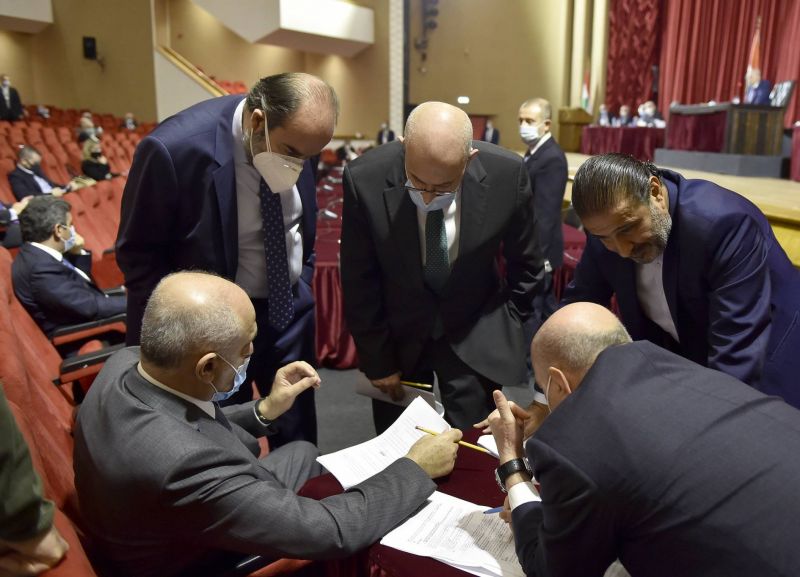
MPs huddle at today’s session of Parliament, called to pass emergency legislation related to COVID-19 vaccines. (Credit: Hasan Ibrahim/Parliament)
BEIRUT — Lebanon’s Parliament passed a law permitting the use of emergency vaccines Friday, the second day of an unprecedented 11-day total lockdown as hospitals battle the country’s most dangerous surge of coronavirus cases to date.
The law protects producers of any COVID-19 vaccines used in Lebanon from potential liability claims for two years. The first batch of some 2.1 million doses of the Pfizer-BioNTech COVID-19 vaccines is expected to arrive next month, while President Michel Aoun announced Friday that he had signed off on a LL26.4 billion appropriation to reserve 2.73 million vaccine doses through the World Health Organization’s COVAX scheme.
The vaccine developments come as hospitals across the country buckle under the pressure of record-breaking daily coronavirus cases and deaths. For the fourth consecutive day, Lebanon registered a record number of deaths due to coronavirus complications on Friday, with 44 people succumbing to the virus. A record 6,154 new COVID-19 cases were detected in the last 24 hours, while 681 patients were in intensive care units and 213 on ventilators.
“We are functioning over capacity,” said Georges Juvelekian, the head of the ICU at St. George Hospital, commonly known as Mustashfa Roum. “We have multiple patients that are in critical condition and we don’t have beds for them.”
The hospital has transformed the fever clinic, typically meant for triage, into a makeshift ICU to treat coronavirus patients, Juvelekian told L’Orient Today.
“We are putting portable oxygen tanks in there and portable monitors and putting staff to watch [patients] in the cubicles constantly,” he said. “Some have been in there for two days because there are no beds in units where we can transfer them.”
Other hospitals across the country have also had to find stop-gap solutions for the influx of coronavirus patients in critical condition. The COVID-19 unit at Nabatieh Governmental Hospital in the south has reached capacity, with six patients currently being treated in the emergency room, said resident doctor Houssein Toufayli.
Meanwhile, the American University of Beirut Medical Center released a statement warning that the hospital is “unable to find beds for even the most critical patients.”
“Our intensive care units and regular COVID-19 units have reached full capacity. Our emergency room is also at full capacity with 40 patients who require immediate admission,” the statement said.
Mount Lebanon Hospital also issued a warning on social media, announcing that the facility is treating over 60 COVID-19 patients. “Our ventilators are currently all being used and our ER is full,” the post said, calling on all residents to adhere to lockdown measures and stay at home.
Friday was Lebanon’s second day under strict lockdown, a state of affairs set to last until at least Jan. 25. Residents are required to stay at home and to apply for hourlong permits to leave the house for “emergencies,” which includes going to the pharmacy, doctor’s office or bakery, among other errands. Grocery stores and food and beverage businesses are permitted to open only for delivery.
While streets were much quieter than normal on Friday, people were seen walking around outdoors while images of minimarkets selling products directly to customers continued to circulate on social media.
Some residents have had no choice but to break lockdown measures. Such closures have disproportionately impacted the most vulnerable residents of the country, which is currently grappling with its worst economic crisis in decades.
In the northern city of Tripoli, where poverty is rampant due partly to decades of neglect by the state, demonstrators blocked the main road leading to Al-Nour Square, protesting the lockdown and demanding that the government secure basic necessities for families in need before confining them to their homes.
Caretaker Prime Minister Hassan Diab had previously announced that the Lebanese Army would be distributing LL400,000 to some 280,000 families “in all regions of Lebanon” to offset the effects of the closure. But it remains unclear whether anyone will actually receive the cash during the lockdown.